Honorary Degree Process

This policy is designed to facilitate the award of an honorary degree by the University to an individual in recognition of their exceptional and outstanding contribution to an endeavour, and to a candidate who is an exemplar of the values and ethos of SETU. This policy establishes the framework to ensure such awards must reflect an exceptional achievement or set of achievements that has shaped society through the arts and sciences, culture (including literature, music, and visual arts), advocacy, social activity, sport, business or other contributions.
Recipients
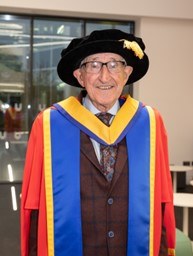
A native of Rosslare, Co. Wexford, where his parents were hoteliers, Liam Griffin studied at the Shannon College of Hotel Management and subsequently spent a decade working in hotels in Wales, Switzerland and Ireland. He later worked in Bord Fáilte to gain experience in the wider tourism industry. In 1974, he purchased his parents’ hotel and from humble beginnings expanded the business to the Griffin Hotel Group which now operates three highly successful flagship hotels in the South East – the Monart Spa, Ferrycarrig Hotel and Hotel Kilkenny.
Liam’s achievement in developing a business to the level and scale that the Griffin Hotel Group has attained is exceptional, and even more remarkable considering that it is a private company. The Griffin Hotel Group is based in the South East, and contributes significantly to employment and the economy in the region. The company is committed to sustainability and to supporting local services and suppliers. Liam is also noted for his discrete philanthropic support of community organisations and charities.
Liam is a former hurler and manager, most notably managing the Wexford senior hurling team in the 1995-96 season, and guiding them to All Ireland success after a gap of 28 years. His coaching style was marked by his tactical astuteness, motivational prowess, and ability to instil a winning mentality in his players. He fostered a culture of teamwork, determination, and resilience, inspiring the team to reach new heights of achievement. After his managerial career, Liam continued his involvement with Gaelic Athletic Association development and appeared regularly as a sports pundit on radio and television, including RTÉ’s The Sunday Game and The Right Hook on Newstalk. In 2009, his inclusion on the Sunday Tribune’s list of the 125 Most Influential People in GAA History is testimony to his contribution to the sport; he was inducted into the Hall of Fame at the Gaelic Writers’ Association annual awards in 2019 and received a Wexford Gaelic Athletic Association Seana Ghael Award in 2021, both to acknowledge his outstanding achievements in hurling.
The award of Doctor of the University to Liam Griffin is a recognition of his outstanding entrepreneurial skills and business acumen, his remarkable sporting achievements, agus his unwavering commitment to enhancing the economy and community in the South East.
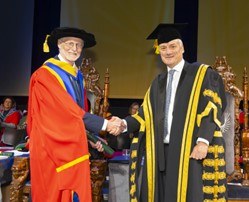
Éamonn McEneaney is a scholar, author and cultural advocate, who has made a seminal contribution to the preservation of Waterford’s heritage, and the interpretation of same. Educated in Waterford at Stephen Street National School and De La Salle College, Éamonn studied History and Political Science at Trinity College, Dublin. He subsequently taught in Our Lady of Mercy Secondary School, Waterford before joining Waterford Corporation, as it was then known, in 1992 to spearhead the establishment of a museum in the city.
Éamonn has had a distinguished career in museum management, including 25 years as Director of the Waterford Museum of Treasures, during which time he made an outstanding and enduring contribution to the city. Under Éamonn’s leadership, Waterford saw the initiation and completion of the Viking Triangle Project, Ireland’s only Museum Quarter, and the adoption of cutting-edge modern technology as a tool to educate and engage visitors in the history of the city and establish it as a destination for cultural tourism.
Éamonn has published widely on Waterford’s social and civic history from the Viking era to the present day. He has lectured in Europe and the United States and was a member of the Heritage Council of Ireland, where he chaired the Museums and Archives Committee. His contribution to voluntary and community projects in Waterford is also significant: he worked with Waterford Civic Trust, for instance, on the restoration of the 15th century Beach Tower in Jenkin’s Lane.
In 2019, Éamonn was awarded The Royal Norwegian Order of Merit in recognition of his pivotal role in enhancing the understanding of Viking history in Ireland, and of his importance in enriching the connections between Norway and Ireland. Éamonn’s love of, and pride in, Waterford city, and his drive to protect its Viking heritage is unquestionable. His career serves as an exemplar of how vision, passion and commitment can contribute to the physical, cultural and economic landscape of a city.
The award of Doctor of the University to Éamonn McEneaney is a recognition of his outstanding contribution to Irish history and heritage, and of his exceptional vision and leadership in leading the development of the Waterford Museum Quarter.
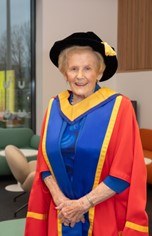
Anna May McHugh is a seminal and influential figure in contemporary Irish agriculture, and is best known as the long-serving Secretary and Director of the National Ploughing Association. Raised on a farm in Co. Laois, Anna May began her working life in 1951 as assistant to JJ Bergin, co-founder of the National Ploughing Association. She was subsequently appointed company secretary when the National Ploughing Association incorporated as a limited company in 1956, and selected as Managing Director in 1973, a position which she holds to the present day.
Under Anna May’s stewardship the National Ploughing Championships have grown phenomenally and have significantly promoted Irish agriculture on both national and international platforms. Through her leadership the Championships have been transformed into a world-class event that not only celebrates agricultural skills but also promotes rural business, technology, and culture. Indeed, her ability to anticipate industry trends and adapt the championships accordingly has been key to their success. Her strategic vision, exceptional organisational skills and unwavering dedication have developed the championships into one of the largest outdoor events in Europe and the biggest National Ploughing Championships in the World. She is a trailblazer who has made a significant contribution to the advancement of agriculture in Ireland. In addition, her success in a male-dominated industry and her advocacy for women in agriculture has been pivotal in empowering females in the sector.
Anna May is an exemplar of dedication, innovation and leadership in the promotion of rural Ireland and agricultural excellence. Her achievements have been honoured by numerous awards, including Veuve Clicquot Business Woman of the Year Award (2013), the Order of Agricultural Merit from the French Ministry of Agriculture (2015) and Honorary Doctorates from the National University of Ireland (2014), Harper Adams University.
The award of an honorary doctorate from South East Technological University to Anna May McHugh is a recognition of her exceptional leadership, business acumen, innovation, and strategic vision, and of her advocacy for the agricultural sector and rural communities.
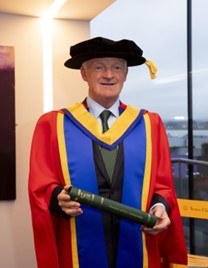
Willie Mullins is one of the most successful, consistent and respected trainers in the history of horse racing. Originally from Goresbridge, Co. Kilkenny, he now runs a thriving racing operation at Closutton, in Bagnelstown, Co. Carlow. A former jockey, he was Irish amateur champion on six occasions during his riding career. As a trainer he has been a dominant force in the racing world for decades and continues to set the standard for excellence in horse training. He has been Irish National Hunt Champion Trainer on eighteen occasions and is the most successful trainer in the history of the Cheltenham Festival. He was named British Jump Racing Champion Trainer in the 2023-24 season, only the second Irish-based trainer to ever achieve the award and the first to do so since 1954. In May 2024 he became the winning-most trainer in Irish racing history when his tally of career winners reached 4,378.
Willie’s influence, however, extends beyond his training successes; he is seen as a key figure in shaping the future of horse racing. His insights and contributions on the sport are highly valued, and he serves as an inspiration to aspiring trainers. He is highly respected by his peers, owners, jockeys, and racing fans for his integrity, commitment, professionalism, dedication, and sportsmanship.
Willie’s legacy in horse racing is marked by his unparalleled success as both a jockey and a trainer, his innovative approach to training and his enduring impact on the sport. In addition, his success in the racing world has brought justifiable pride to, and encouraged a sense of community in, his local area as well as contributing significantly to the local economy.
The award of Doctor of the University to Willie Mullins is a testament to his exceptional skill, determination and versatility as a jockey and trainer, his outstanding and sustained success in the sport, and the unique and transformative impact he has had, and continues to have, on Irish racing.
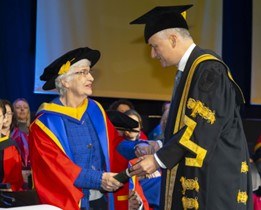
Sr Brigid Reynolds is a dedicated advocate for social justice, who combines academic expertise, moral conviction and an unwavering commitment to ensuring that the voice of the vulnerable and marginalised is represented in public policy debate. Originally from Mohill, Co. Leitrim, Sr Brigid completed a Science degree at University College Dublin before entering the Marist Sisters Religious Order. On profession her first assignment was to Northern Nigeria, where she lectured in a Teacher Training College and began her lifework of social justice advocacy as secretary to an Episcopal Commission, which worked to tackle poverty and promote social inclusion.
On her return to Ireland in 1980, Sr Brigid taught Science at post-primary level before being recruited by the Conference of Major Religious Superiors, or the Conference of Religious of Ireland (CORI), as it was later known. In 1983, she was joined in CORI by Fr Seán Healy and together they spearheaded CORI’s Justice Commission which advocated for social justice through education, policy development, engaging with government and civil society, and promoting and commenting on social justice issues through the media. In 2009, Sr Brigid and Fr Healy co-founded Social Justice Ireland, an independent advocacy organisation that focuses on promoting social justice, sustainable development, and equitable economic policies. Sr Brigid’s vision, commitment and dedication have been central to the success of Social Justice Ireland.
South East Technological University and Social Justice Ireland currently collaborate on the delivery of a Master’s degree in Social Justice and Public Policy to which Sr Brigid has generously contributed her expertise. Her contribution to the literature on public policy in Ireland is also substantial: indeed, she has co-authored or co-edited over forty books on public policy or on spirituality for social engagement.
She is an educator and humanitarian who dedicates her life to empowering marginalised communities and championing social justice. Her life and work serve as a shining example of the positive change that can be achieved through compassion, dedication, and a steadfast commitment to the greater good.
The award of Doctor of the University to Sr Brigid Reynolds is an acknowledgement of the indelible mark she has made on social justice advocacy, and a recognition of her commitment to addressing inequality, poverty, and social exclusion.
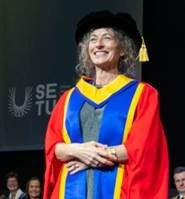
Carrie Crowley has made a major contribution to Irish cultural life through her career on radio and television and as an actor. She began her broadcasting career as a presenter on WLR FM in her native Waterford and quickly became a recognisable voice on Irish airways due to her natural charisma and affinity with the audience. Her radio career paved the way for her transition to television, where she became a household name.
A fluent Irish speaker and former primary school teacher, she moved to Raidió Teilifís Éireann (RTE) in 1996, to work in children’s programming, acting in the pre-school series The Morbegs as the character Liodáin and co-presenting the Irish language version of Echo Island. She co-presented the Eurovision Song Contest in 1997 with Ronan Keating, and also presented a number of other programmes on television, notably TurasAnama, Potluck, Pulse and her own chat show Limelight. She later returned to radio with the weekly interview programme Snapshots which ran for five years on RTE Radio 1.
As an actor, Carrie Crowley began her professional career with the Red Kettle Company in Waterford and went on to enjoy a successful career on stage and television, and in film. Her ability to immerse herself in diverse roles and bring authenticity to her characters is key to her success as an actor and a testament to her talent and dedication to her craft. Her roles in television dramas, including Smother, Fair City, Ros na Rún, Vikings, The Running Mate and Rásaí na Gaillimhe, to mention just a few, gained international recognition for the multitalented actor. Her impressive acting portfolio also includes Irish and international film such as Earthbound (2012), Stay (2013), and Baltimore (2023). In parallel with her work on television and film, she continues to perform on stage and made a return to the Theatre Royal Waterford in 2021 to play in Beckett’s Footfalls.
Carrie Crowley’s love of, and fluency in, the Irish language has ensured that Irish-language broadcasting and acting have been a seminal part of her career; from her early days presenting Irish language children’s television to starring in Irish-language short films, such as An Gaeilgeoir Nocht (2006), to her role as Eibhlín Cinnsealach in An Cailín Ciúin (2022), a role for which she received an Irish Film and Television Academy Best Actress nomination. As the first Irish-language film to be nominated for an Oscar, An Cailín Ciúin brought justifiable pride to Ireland and to its native language, and Carrie Crowley was central to this achievement.
Carrie Crowley is an outstanding Irish broadcaster and actor whose unique talent and versatility has earned her an international reputation. The award of Doctor of the University acknowledges her contribution to Irish cultural life through her work as a broadcaster and actor, as a fervent advocate of the Irish language and, most recently, in her role in the Oscar-nominated film An Cailín Ciúin.
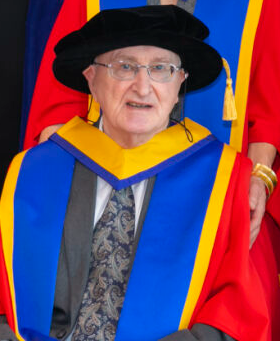
Professor de Paor, a distinguished engineer, an Irish scholar and a humanitarian, is an exemplar of excellence in multiple academic and cultural domains. In the field of engineering, he is arguably the most highly accomplished electrical engineer in Ireland of his generation, and one of the few with an international reputation for advanced research. An electrical engineering graduate from University College Dublin, Professor de Paor went on to obtain a masters degree from the University of California, Berkeley, and a doctorate from the National University of Ireland (through UCD). He was subsequently awarded a Senior Doctorate by the National University of Ireland in 1987 and an Honorary Doctorate by the then Dublin Institute of Technology in 2004. He lectured in both the University of Salford and University College Dublin, culminating in his appointment as Chair of Electrical Engineering at University College Dublin in 1978.
Professor de Paor is a renowned expert in control theory and has applied ideas from this field to develop new research activities in biomedical engineering and renewable energy. His research and teaching have played a significant role in advancing Ireland's capabilities in these critical areas. His contributions include the seminal textbook Introduction to Dynamics and Control (1978), over 200 research papers, founding the Rehabilitation Engineering Laboratory at the National Rehabilitation Hospital in 1986 and co-founding the Centre for Disability at University College Dublin a decade later.
Professor de Paor is a passionate supporter of the Irish language, culture and heritage. He is a dedicated advocate for Gaeltacht na nDéise and was elected Chair of Daonscoil na Mumhan in 2006. An Irish speaker and scholar, he has published books in the Irish language with Coiscéim Publications, including: Buan ar Buairt (1985); Dubcek faoi Cháil is faoi Scáil (1997); Beirt Mháirnéalach (2003); and Duanaire Daonscoile (2014)
Professor de Paor was born and reared in Waterford and his career serves as an inspiring example of an individual excelling in diverse fields, bridging the worlds of engineering and cultural preservation. The award of an honorary doctorate to him is a recognition of a career of the highest distinction in academia and engineering, and of a rare cross-disciplinary intellectual energy which has contributed beyond his engineering expertise.
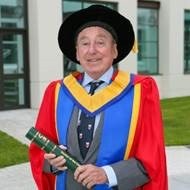
A native of Bagenalstown, county Carlow, he was educated at Rockwell College, University College Dublin, and the University of Strathclyde. Dr Manning lectured in politics at University College Dublin, where he became Adjunct Professor in Political Science and International Relations. A great many of his students, influenced by his strong sense of public service and his constitutional values, have gone on to distinguished positions in public life. He has published widely, particularly in the area of modern Irish constitutional politics; his publications include James Dillon: A Biography (2000), and The Blueshirts (1973 and 2006).
Dr Manning was elected as a member of the Senate of the National University of Ireland for 27 years and he served on the Governing Authority of University College Dublin for 29 years. In 2009, he had the distinction of being elected Chancellor of the National University of Ireland, only the fifth person to hold the position since its establishment in 1908. Dr Manning was an elected public representative for 21 years, serving in both Dáil and Seanad Éireann. During that time, he was appointed both Leader of Seanad Éireann (1995-1997) and Leader of the Opposition in the Seanad (1997-2002). Throughout his political career, he was an advocate for higher education, Irish language and culture.
Dr Manning was nominated by the then Taoiseach Garret FitzGerald to be a member of the New Ireland Forum which was established in 1983 to identify new constitutional options for Northern Ireland. He also served for many years as a member of the British-Irish Inter-Parliamentary Body. In 2002, Dr Manning was appointed as the President of the Irish Human Rights Commission, a position which he held until 2014. In 2006, he became Chair of the European Group of National Human Rights Institutions, serving two successive terms in this role. Currently, he is Chair of the Expert Advisory Group on the Decade of Centenaries, the programme of events and commemorations marking the achievement of independence and the foundation of the Irish state.
Dr Manning has had a distinguished career in both the academic and political worlds, always bringing his unique skills to bear in advancing mutual understanding between both. As a scholar, politician, statesman and advocate, his influence extends far beyond his political and literary achievements, and his dedication to the principles of justice, equality and cultural preservation has helped shape Irish society. The award of Doctor of the University to him is a recognition of his achievements in, and lifelong contribution to, education, politics, human rights and scholarship.
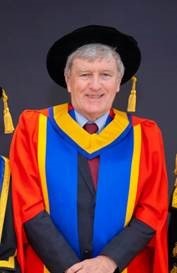
Daniel Mulhall is a diplomat, an author and a scholar who has enjoyed a long and distinguished career in the Irish Diplomatic Service.
A native of Waterford, and a graduate of University College Cork, Daniel Mulhall joined the Department of Foreign Affairs in 1978 and subsequently held diplomatic positions in New Delhi, Vienna, Brussels and Edinburgh. He served as the Irish Ambassador to Malaysia (2001-05), Germany (2009-13), Great Britain (2013-17), and the United States of America (2017-22). In addition, Daniel Mulhall held an array of senior positions at the Department of Foreign Affairs, including Director General for European Affairs (2005-09). He was also a member of the Secretariat of the Forum for Peace and Reconciliation (1994-95) and the Irish Government delegation which negotiated the Good Friday Agreement in 1998.
Daniel Mulhall has a lifelong passion for Irish history and literature, and a deep commitment to education. He is a scholar, and lecturer who has published numerous books, book chapters and articles on Irish history and literature, and international relations. He is the author of A New Day Dawning: A Portrait of Ireland in 1900 (1999), Ulysses: A Reader's Odyssey (2022), and Pilgrim Soul: W.B. Yeats and the Ireland of his Time (2023) and co-editor of The Shaping of Modern Ireland: A Centenary Assessment (2016). As a writer and an intellectual, he has embraced public diplomacy and uses social media, blog posts and podcasts to disseminate insights into his diplomatic work and to promote Irish culture, history, and literature. On his retirement from the Department of Foreign Affairs in 2022, he was appointed as a Global Distinguished Professor of Irish Studies at Glucksman Ireland House, New York University and Parnell Fellow at Magdalene College, Cambridge. In 2023, he was appointed Resident Fellow at the Institute of Politics at Harvard University’s Kennedy School.
Daniel Mulhall's diplomatic career is marked by his unwavering commitment to, and his exceptional ability in, navigating complex issues, maintaining positive bilateral relations, promoting Ireland’s interests internationally, and fostering international cooperation and reconciliation. His legacy, however, extends far beyond his achievements in political diplomacy; he is a cultural ambassador who has shared the richness of Irish literature, culture and arts with an international audience. His extensive scholarship and experience across literature, history, and politics has contextualised the understanding of the world through a multidisciplinary lens.
The award of Doctor of the University to Daniel Mulhall is a recognition of his exceptional ability, his career at the forefront of Irish and international politics, and his outstanding contribution to Irish culture through his scholarship and advocacy. His career serves as an exemplar of the power of diplomacy in bringing nations closer together and in celebrating their shared values and heritage.
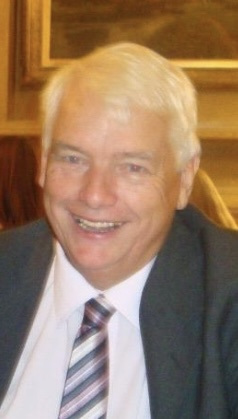
A native of Kill, Co. Waterford, the late Peter Queally was one of Ireland’s top entrepreneurs and businesspeople. His journey from a small farm in rural Waterford to leading a major agri-food conglomerate is a testament to his vision, hard work, business skill and his ability to identify and capitalise on opportunities.
A serial entrepreneur, risk taker and investor, his early business interests, in conjunction with his brother John, were in quarrying, farming, construction and cold storage. He co-founded Dawn Meats in 1980, and building on the success of that company, John and he established the Queally Group, a locally-led, international-group of brands in the agri-food industry, that has grown to become one of the largest privately-owned, agri-business groups in Europe with a multi-billion-euro annual revenue, thousands of employees across multiple countries and a global market presence.
The group, under Peter Queally’s stewardship, has contributed to the entrepreneurial spirit of the South East and has provided a regional growth platform in an industry that is central to the region. The global company has its headquarters in Waterford and contributes significantly to employment and the economy in the region. Innovation in its product provision is a hallmark of the Queally Group, making it one of the most pioneering companies in its sector in Ireland and the United Kingdom. Innovation is not confined to product development, however, as Peter Queally’s creativity in marketing, sales and identifying business opportunities has built the company to the global entity it is today. The company has continually expanded its operations, both domestically and internationally, which speaks to his strategic thinking and ability to navigate complex markets.
He was also noted for his discrete philanthropic support of charities, and community and sporting organisations. He was Director and benefactor of Tramore Racecourse for 25 years, and he was instrumental in ensuring the track’s survival in challenging times.
Peter Queally’s contribution to developing and growing a business to the level and scale that the Queally Group has attained is exceptional, even more remarkable considering that it is a private company. His legacy in the agri-food industry is marked by his entrepreneurial spirit, commitment to innovation, and dedication to sustainability. His business acumen demonstrates a successful blend of strategic vision, risk taking, innovation, and leadership which have not only driven the growth of his companies but also had a positive impact on the broader agri-food industry. Indeed, he was recognised as a seminal figure in shaping the landscape of food production in Ireland and beyond.
The award of Doctor of the University was conferred in abstentia to Peter Queally in 2024 and is a recognition of his entrepreneurship and achievement in scaling a local business to a global force and his significant contribution to the community and economy in the South East.

